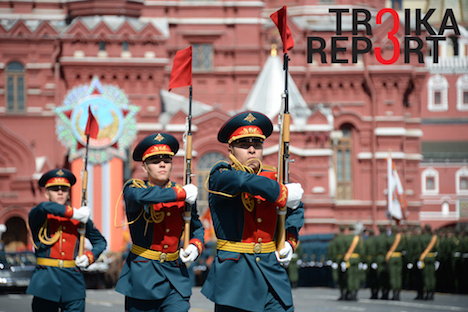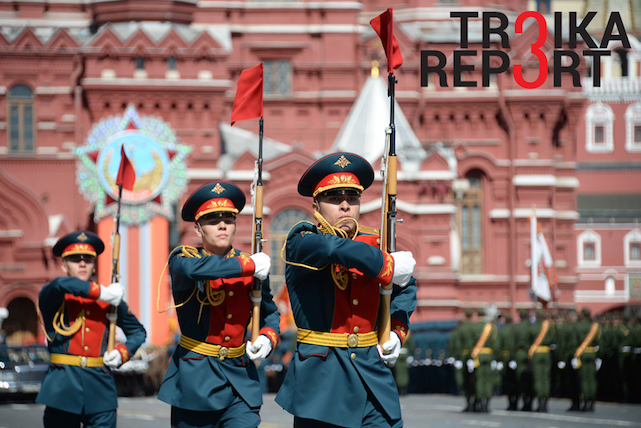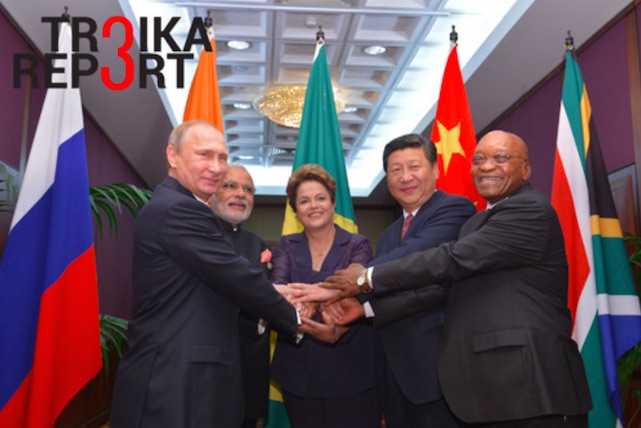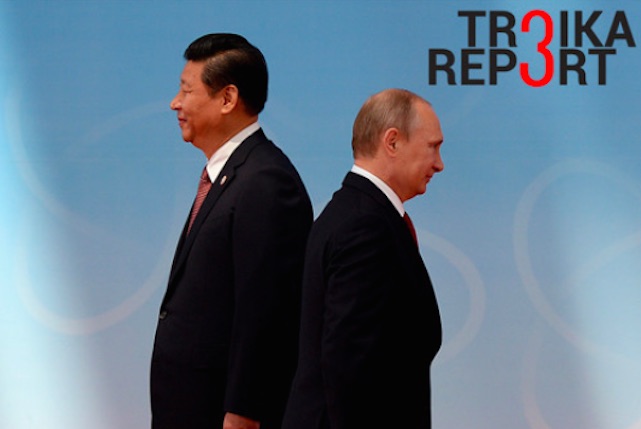

Russian soldiers march along Red Square during a general rehearsal for the Victory Day military parade. Source: Ilya Pitalev/RIA Novosti
This year’s solemn celebrations of Victory Day in Moscow to mark the 70th anniversary of the defeat of Nazi Germany in 1945 has turned out to be a divisive event in Russia’s relations with the major Western powers. It happened despite the legacy of the anti-Hitler coalition and the indisputable fact that most of Eastern and Central Europe was liberated by Soviet soldiers who sacrificed their lives in what was a truly existential war.
The conspicuous absence of Western leaders at the Victory Day military parade in Moscow comes as a bitter disappointment not just for President Putin, ageing veterans and ordinary folk, but also for liberal-minded Russian intellectuals who had pinned their hopes on long-standing ties with the West as a seemingly natural offshoot of their former comradeship-in-arms.
Yet, in Russia it is still widely acclaimed that victory in World War II was achieved largely by means of an alliance between the Soviet Union, the United States and Britain. The Lend-Lease supplies marked “Made in the USA” arrived in a steady stream and filled the deficit of the war-torn Soviet economy. The U.S. government would send the Soviet Union fighters and bombers, heavy-duty Studebaker trucks, canned meat (ironically nicknamed “the second front” by Russians), and other essential products. In total, American deliveries had a price tag of $50 billion, and it was worth every cent loaned to the USSR at that time.
This was no small contribution to the common cause, although Moscow, Washington and London did not see eye to eye on many issues, and were uncompromising ideological adversaries.
Today, Russia would like to capitalize on the feelings of gratitude toward the allies, and is willing to appeal to this experience as a model of meaningful cooperation in a contemporary world ravaged by often incompatible interests, regional conflicts, and sectarian violence.
This viewpoint is essentially shared by Alexander Domrin, professor at the Higher School of Economics in Moscow, who also lectures at U.S. universities. He made the following comment for Troika Report:
“The 70th anniversary reminds us that it was not only a mutual engagement between the Soviet Union, the UK and the U.S. — it was the greatest alliance of the 20th century. It was an alliance against what we in Russia call the “brown plague.” It was not only an alliance against Nazi Germany. By 1941 most of Europe had been conquered by the Nazis. It is notable that in 1945 the Reichstag in Berlin was defended not only by Germans but also by their collaborators from several European countries, including nationals of France and Holland. Seventy years later, the memory of this great alliance should prevent America and the UK from further aggravating their relations with Russia today.”
Today, are there common threats which could make the West and Russia once again stand together, shoulder to shoulder, and work together to make the world safe, secure and prosperous?
“Number one is international terrorism. It is a real global danger. Nazism was an ideology but terrorism is not. It can be used by different people in different parts of the world and it is a major threat for the whole of civilization. This is something which should definitely unite us with the West.”
Unlike the official abstention, several Western NGOs and cultural figures have found it appropriate to commemorate Victory Day in their own manner. Here are just two striking examples to prove the point. Firstly, Edward Lozansky, president of the American University in Moscow and professor of the National Research Nuclear University, initiated a tree planting ceremony in Moscow to commemorate the Elbe River linkup between American and Soviet troops.
Secondly, Dutch journalist and researcher Remco Reiding presented his book in Moscow on the scrupulous work he has been doing since the 1990s on identifying Soviet soldiers whose unnamed graves are found in the cities of Amersfoort and Leusden. In spite of rather cool relations between the Netherlands and Russia after Malaysia Airlines Flight MH17 was brought down over eastern Ukraine in 2014, the presentation was organized by the Dutch Embassy.
Troika Report strongly believes that history should not be hijacked by temporary disagreements on a governmental level and should not be made hostage to old animosities, especially in view of the new global threats rooted in the rise of sectarian and religious extremism.

Last time BRICS leaders met before the G20 summit in the Australian city of Brisbane on November 15, 2014 (pictured above). Next time they will see each other in the Russian city of Ufa this summer. Source: Alexei Druzhinin/RIA Novosti
Russian President Vladimir Putin has ratified a deal to establish a $100 billion foreign currency reserve pool for the BRICS group. The move is largely viewed as another part of the BRICS strategy to gain additional leverage by presenting an alternative to the World Bank and IMF.
By doing so, BRICS is challenging the monopoly of the two established Western financial institutions in their capacity of global lenders.
In July last year, Russia, Brazil, India, China and South Africa formally signed and sealed the document outlining the parameters of a reserve currency pool worth over $100 billion, as well as the $100 billion BRICS Development Bank.
The ratification of the deal took place two months prior to the BRICS summit scheduled for July in the central Russian city of Ufa.
Troika Report approached Georgy Toloraya, executive director of the Russian National Committee of the BRICS research center, for comment on the recent developments.
How valuable is this move for Russia in terms of its economic growth?
“I think this measure has both symbolic and practical value. The currency reserve pool was agreed in Fortaleza in July last year. So the BRICS countries are moving on quite steadily, increasing their consolidation, especially in economic and financial affairs. The planned reserve pool will help countries to stabilize their currencies in case of crisis, which is quite relevant, without addressing the International Monetary Fund.
For example, South Africa can get two times the amount of money it has reserved for the pool. Russia, Brazil and India can receive the same amount they have allocated, while China has access to half the amount it invested. This is logical since the Chinese share is the biggest one: It is $41 billion. This gives China, naturally, the leading role in the institution but the principle of equality is unchallenged.
The pool also operates in accordance with international rules: If a country receives more than 30 percent of its quota, it has to present some kind of stabilization plan agreed with the IMF and made up in accordance with IMF rules. It means that it is not a substitute for the IMF, as some critics claim, but a good addition to it. Yet, it has a competitive edge to provide aid to countries not dependent on the IMF and U.S. dollar-pegged systems.”
The claim that there is a “competitive edge” has been put to doubt by some experts, however, who have pointed out that smaller developing countries with a track record of poor governance and inability to make repayments would be unlikely to profit from the BRICS Development Bank despite being in desperate need of investment in infrastructure.
The optimists, on the contrary, believe that if BRICS proves to be a reliable lender it could become in the long run an alternative to the World Bank and IMF, which usually demand privatization and liberalization in return for loans.
Troika Report also asked Georgy Toloraya whether the upcoming Ufa summit might become a game-changer for Russia in this respect.
“The summit will be important for Russia now that it has difficult relations with the West amid an economic crisis. Russia would welcome cooperation with BRICS and would like to see the consolidation of the union. The grouping is becoming a more important player in global economic affairs and in geopolitics too. The Ufa summit will adopt a strategy of economic cooperation along with a roadmap for investments. The summit will be another step in the institualization of BRICS. I don’t think it will be a game-changer, but certainly another step forward in the development of BRICS.
True enough, BRICS has the prerequisites for evolving into a powerful union. Altogether, BRICS nations combine 42 percent of the world’s population, some 20 percent of the global economy based on GDP, with total trade between the countries of more than $6 trillion, or nearly 17 percent of the world’s total.
For these reasons alone, the Ufa summit should be followed with due vigilance. It is expected to sustain the gradual advancement of the five nations towards a full-fledged “alliance of the willing.” Willing, most probably, to assert themselves as a formidable union spreading across three continents, although for now their ambitions remain confined to economy, trade and finance.

Russian President Vladimir Putin, right, is greeted by Chinese President Xi Jinping before the opening ceremony at the Expo Center at the fourth Conference on Interaction and Confidence Building Measures in Asia (CICA) in Shanghai on May 21, 2014. Source: AP
China's President Xi Jinping will be the most influential world leader to attend the World War II anniversary commemorations in Moscow on May 9. On the eve of the visit, Vice Foreign Minister Cheng Guoping emphasized that “China and Russia were the main theaters in Asia and Europe during the Second World War and are the main victorious nations of the Second World War.”
The Chinese leader will also hold talks with his Russian counterpart, Vladimir Putin, and negotiations on the ministerial level are expected to culminate in the signing of a raft of cooperation agreements covering areas such as space and aviation, the energy sector, tax regulation, and finances. The icing on the cake would be an official statement on enhancing what has become known as the “strategic partnership” between Moscow and Beijing.
Presidents Xi Jinping and Putin will be meeting three times in the coming two months, next time within the BRICS format and the Shanghai Cooperation Council summit in the Russian city of Ufa.
Russia and China seem to be cutting corners in laying the groundwork for the formation of what some pundits have labeled the “Big Two,” although previously the Big Two meant China and the U.S. How viable is the emerging alliance and does it pose a challenge to other nations?
Alexander Lomanov, Head Research Fellow at the Institute of Far Eastern Studies at the Russian Academy of Sciences in Moscow, has this to say:
“The earlier version of the G2 formed by China and the United States, proposed more than 5 years ago, did not look viable due to increased competition between the two nations. It’s like the old leader and the new would-be leader of the world; they cannot join each other in such an enterprise. On the contrary, there is nothing that Russia and China can quarrel about. Of course, it might be unsettling for some people since China still looks unfamiliar in the role of a new leader. Many still regard China as a “developing country.”
For Russia and China it could be a “soft alliance” with a very weak or diluted military component but with a lot of trade, investment flows, joint production, and mutual support in international affairs. It will be different from relations between China and the United States since the latter will never abandon its idea of transforming the political system of China. Russia will never try to do this since it is not the would-be hegemon and leader of the 21st or 22nd century. While it is natural to see Russia wanting to cooperate with the old and declining leader, the United States, it is also natural and foreseeable for Moscow to seek cooperation and develop ties with the would-be world leader, which is China.
- One of the reasons why the “reset” between the U.S. and Russia failed was that Russia did not put up with the concept of a “junior partner.” Could it be that way down the road Russia will become a junior partner to China?
“The American and Chinese notions of a ‘junior partner’ are totally different. First of all, I cannot imagine that China would spend billions of dollars in order to initiate a ‘regime change’ in Russia or topple governments anywhere else in the post-Soviet space. It’s not what the Chinese want to do: They want to make profits, they want enhanced national security, but not through organizing ‘color revolutions.’ There is no political interference in internal affairs from China.
“Another aspect: There is no military pressure on Russia. China has a much bigger defense budget than Russia but it is not at the head of a military alliance that encroaches on the Russian sphere of national security. So it is much more confortable to be a ‘junior partner’ of China than of the United States because you feel neither political nor military pressure. But, of course, Russian GDP is only 20 percent of Chinese GDP and the gap will keep growing.”
- Some believe the Russo-Chinese duo can challenge American dominance – what do you think?
“The only challenge would be resistance to American attempts to influence Russia’s and China’s domestic policies, and collective defense measures against military pressure, in particular the American anti-ballistic missile systems, which could devalue Russian, but to a greater extent the much smaller Chinese strategic deterrence. Symmetrical challenges create a symmetrical response.”
All rights reserved by Rossiyskaya Gazeta.
Subscribe
to our newsletter!
Get the week's best stories straight to your inbox